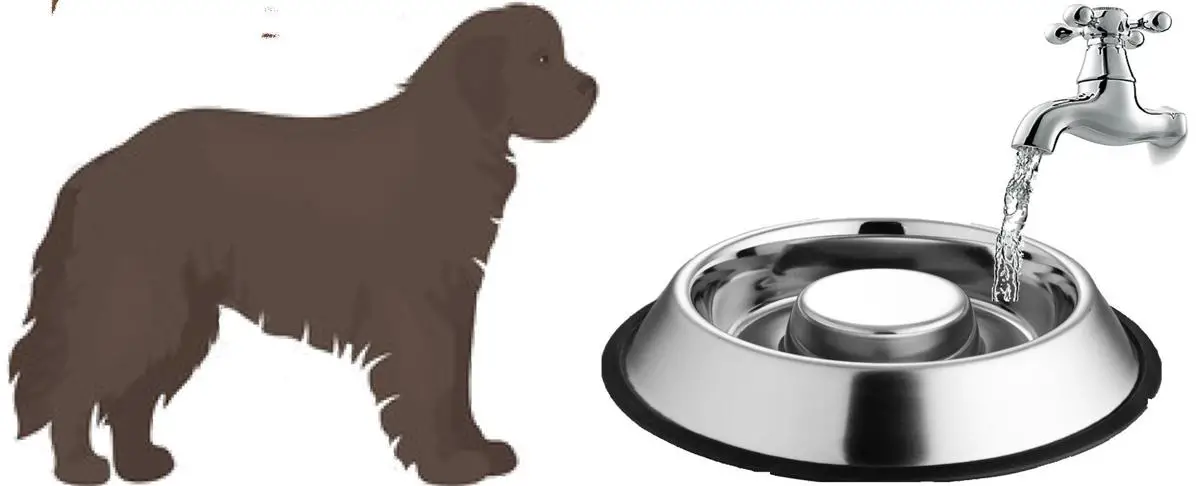Quick Links: Table of Contents
- Newfoundland Breed Overview
- History of the Newfoundland Breed. Where Newfoundlands came from
- What the Newfoundland Looks Like
- How Much is the Newfoundland Puppy?
- Best Newfoundland Breeders
- Adopting or Rescuing the Newfoundland
- Newfoundland Growth
- The Temperament of the Newfoundland
- How Long Newfoundlands Live
- Newfoundland Litter Size
- How Fast Newfoundlands Can Run
- Good Names for Newfoundlands
- How Intelligent are Newfoundlands?
- How Popular are Newfoundlands with New Dog Owners?
- Health Problems in Newfoundlands and How to Prevent Them
- How to Take Care of Newfoundland
- Dog Breeds That Are Similar to Newfoundlands
- Other Things to Know About Newfoundlands
Newfoundland Breed Overview
The Newfoundland is a giant-sized dog.
The adult Newfoundland stands 2 feet, 1 inch to 2 feet, 5 inches tall at the sho.
The Newfoundland belongs to the Working Dogs group.
Dogs in the Working Dogs group, like the Newfoundland, were developed to assist humans in some capacity – including pulling sleds and carts, guarding flocks, guarding homes, and protecting their families.
Breeds in the Working Group are known for their imposing stature, strength, intelligence, and fearless.
Because of their size and strength, working dogs require a structured home life and firm, fair, consistent training by someone who can provide leadership without resorting to anger or physical force.
The fact that the Newfoundland belongs to the Working Dogs group is one of the reasons why Newfoundlands have the personality and temperament that they have.
The temperament of the Newfoundland is generally described as:
- Gentle
- Sweet-Tempered
- Trainable
History of the Newfoundland Breed. Where Newfoundlands came from
It is believed that ancestors of the breed were brought to Newfoundland Island in Canada by European fishermen.
While the breed`s origins are unknown, some believe he descended from white Great Pyrenees, while others believe he descended from a French hound or the Great Pyrenees.
Many old prints of Newfoundlands show what is thought to be husky ancestry, and the breed is similar to the Labrador (and Newfoundland`s coastline is close to Labrador`s).
Regardless, the Newfoundland evolved to be well suited to the island from which he arose.
The breed`s dogs excel in and around water.
They are excellent swimmers and have saved many lives by rescuing people.
.
What the Newfoundland Looks Like
The Newfoundland is a large dog with a broad, heavy head, a slightly arched crown, and a powerful neck and back.
The Newfoundland dog has a wide, short muzzle; the nose is usually black, with the exception of bronze-colored (typically brown) dogs; and the teeth meet in a level bite.
The eyes are deep set and dark brown, and the ears are triangular in shape with rounded tips that hang by their cheeks.
The legs of a Newfoundland are muscular, straight, and parallel, with webbed feet that are useful in the water.
A strong tail has a broad base and hangs down.
The Newfoundland`s outer coat is oily, coarse, and somewhat long.
.
How Much is the Newfoundland Puppy?

The average price of a Newfoundland puppy is $2160. The price of a Newfoundland puppy ranges from $1875 to $2500.
A lot of factors determine the price of the Newfoundland. These factors include what health records the Newfoundland puppy has, the lineage of the Newfoundland puppy, the US state the breeder is located in, etc.
To estimate how much you can expect to pay for a puppy Newfoundland based on the many factors that determine the price of the Newfoundland puppy, check out our calculator that lets you estimate how much you should expect to pay for the Newfoundland puppy based on what you want in the puppy.
When looking to buy a puppy, look at buying a puppy only from well-established breeders that breed puppies primarily for the love of the Newfoundland breed, and secondarily for profit. Do not buy a puppy from a puppy mill. Puppy mills mass-produce puppies in bad living conditions for maximum profit.
You may also consider adopting instead of buying a puppy. Adoption costs are very low compared to the price of a puppy.
Best Newfoundland Breeders
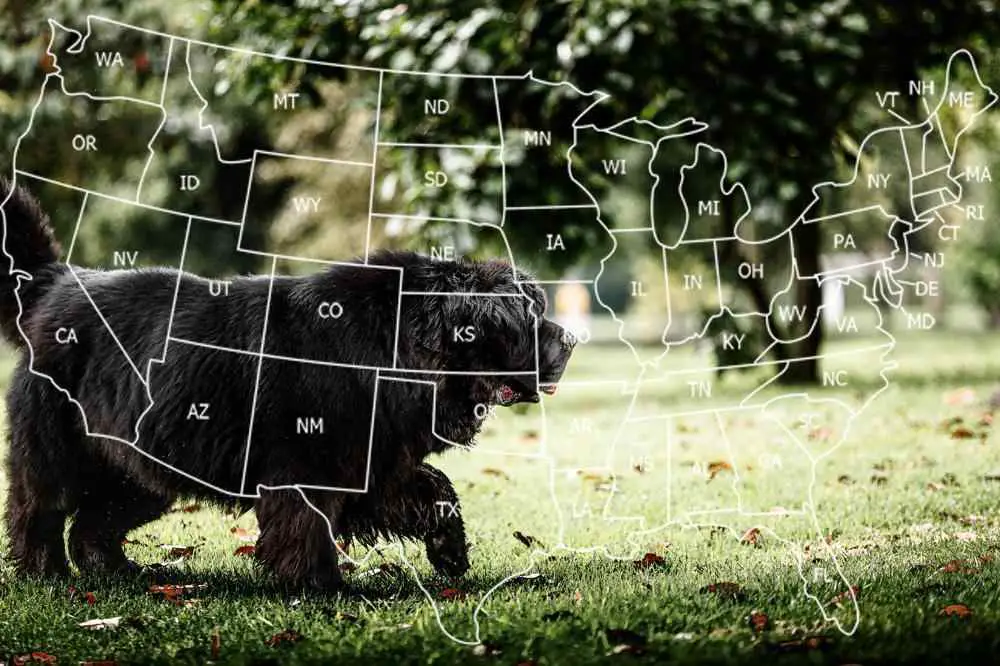
We have researched reputable Newfoundland breeders that you can buy a puppy.
Go to this page for our complete list of reputable Newfoundland breeders in various states in the United States.
On this page, you will see how much these breeders sell their puppies for, and how many puppies they have available.
A few of these breeders are listed below.
Jessica Brunette
Puppy Price: Check with breeder
Bear Paw Newfoundlands
Puppy Price: Check with breeder
D&D Newfoundland
Puppy Price: $3200.00
Hobby Horse Homestead
Puppy Price: Check with breeder
Jared Gehman
Puppy Price: $3200
Adopting or Rescuing the Newfoundland
You may consider adopting a dog instead of buying a puppy. Many dogs, Newfoundlands included, are currently available for adoption in your local dog shelters.
These helpless but adorable dogs are waiting in dog shelters hoping that someday someone will rescue them. Dog adoption costs are lesser than the cost of a new puppy. Dog adoption costs are usually around $300 or even less.
In addition to your local dog shelter, another good place to find dogs that are available for adoption is petfinder.com.
Below is an adorable Male Newfoundland named Deejay that is currently available for adoption on Petfinder.com. You can find other lovely Newfoundlands like Deejay on pefinder.com.
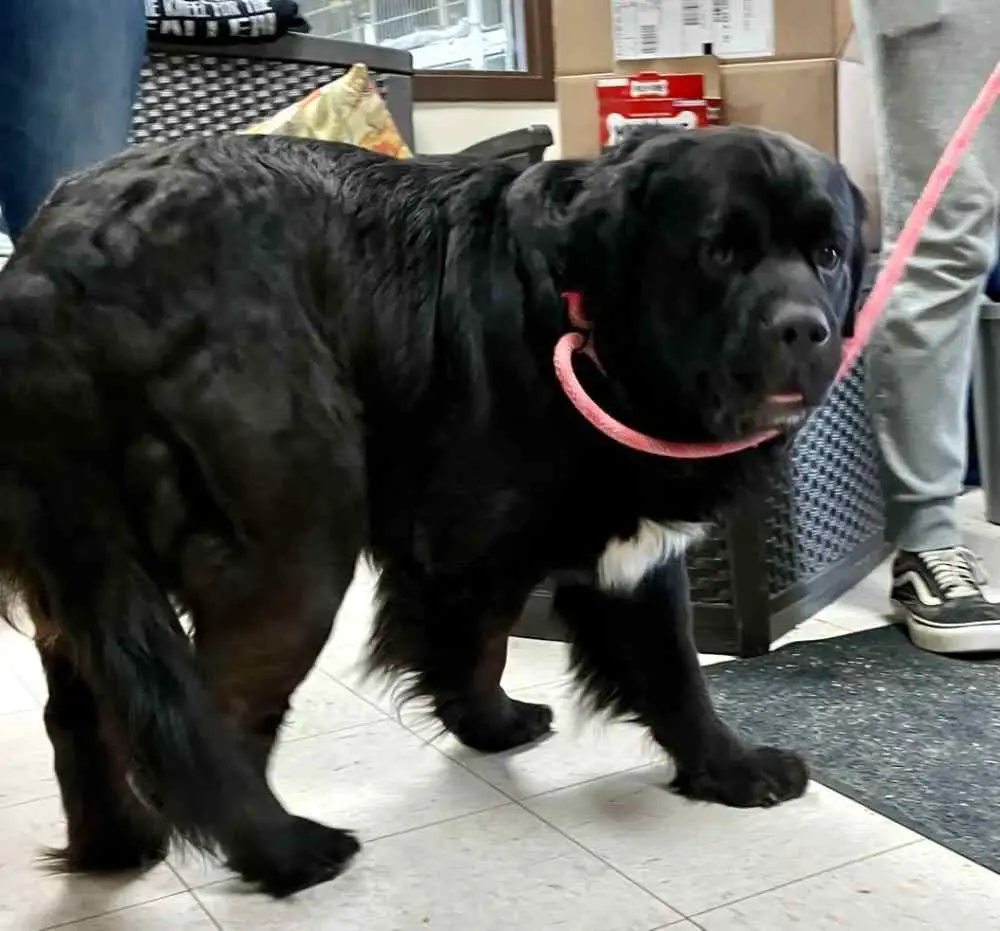
You can find more Newfoundlands that are available for adoption on petfinder.
Newfoundland Growth

New Newfoundland owners need to know about the growth of their Newfoundlands. This will help them plan their living spaces accordingly.
Also, knowing the typical growth pattern of the Newfoundland will help new owners catch the abnormal growth of their Newfoundland early.
See our calculator for predicting how big your Newfoundland puppy will get. You will also learn about the typical weight of the Newfoundland at different ages and how to catch abnormal growth in your Newfoundland
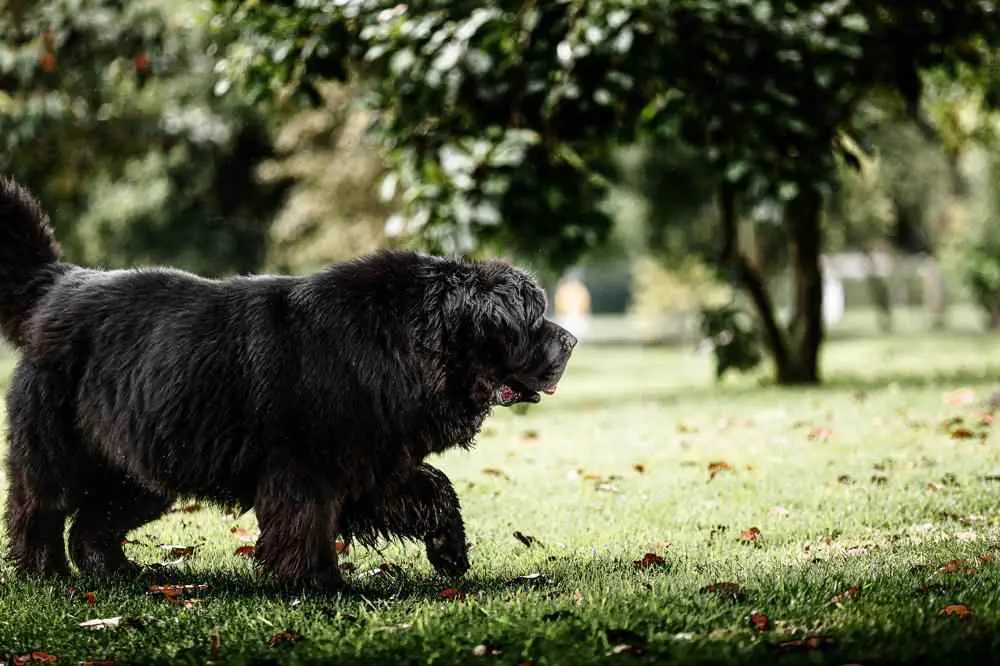
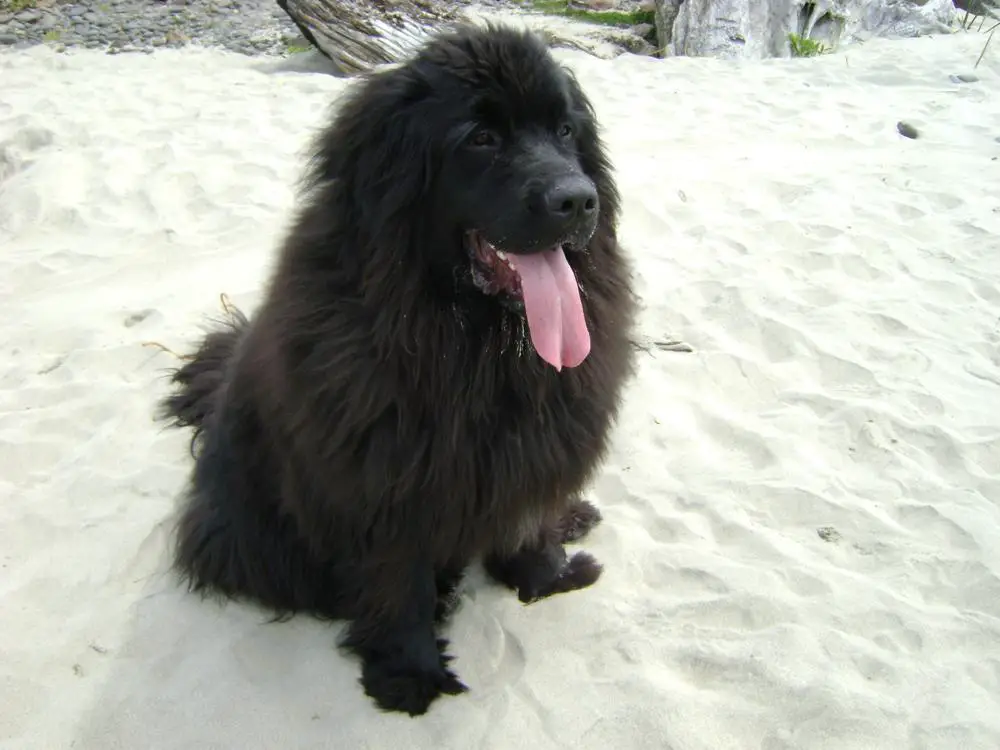
The Temperament of the Newfoundland
The temperament of the Newfoundland based can be summarized as in the table below.
The table shows the scores of the Newfoundland for 13 important dog behavioral factors.
We obtained these scores by analyzing raw data from the C-BARQ dog personality survey tool. The higher the score of a dog for a factor, the worse the temperament of the dog regarding that factor.
The C-BARQ tool was developed by researchers from the University of Pennsylvania, and it is a scientific tool that is used worldwide for reliably measuring the temperament of dog breeds.
See our complete analysis of the temperament of the Newfoundland here.
| Factor | Score |
|---|---|
| Stranger Directed Fear | 6.6 percent |
| Prey Drive | 48.4 percent |
| Excitability | 40.6 percent |
| Attachment Attention Seeking | 37.6 percent |
| Nonsocial Fear | 35.3 percent |
| Dog Rivalry | 32.6 percent |
| Separation Related Behavior | 29.8 percent |
| Energy Level | 27.6 percent |
| Dog Directed Aggression | 27.0 percent |
| Touch Sensitivity | 26.0 percent |
| Dog Directed Fear | 24.9 percent |
| Stubbornness | 24.9 percent |
| Owner Directed Aggression | 21.2 percent |
| Stranger Directed Aggression | 15.8 percent |
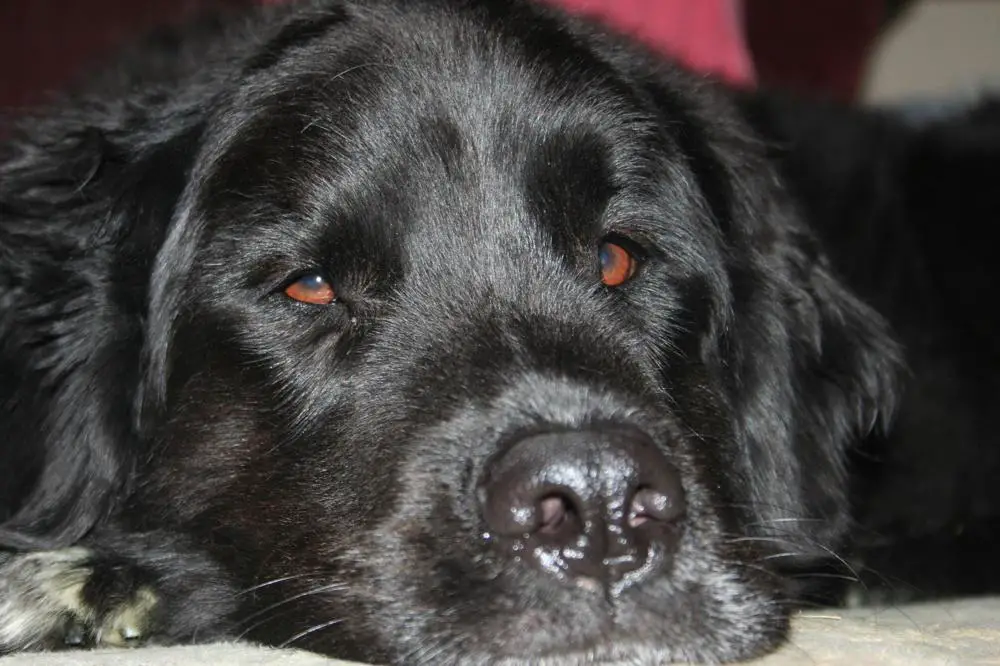
How Long Newfoundlands Live
The lifespan of the Newfoundland is typically from 8 to 10 years.
Moreover, a few years back, veterinarian researchers performed a scientific study to determine the lifespan of the Newfoundland. In this study, the scientists collected data on how long 269 pet Newfoundlands lived.
From the study, it was found that Newfoundlands have an average lifespan of 9.67 years. Furthermore, the study found that it is not uncommon for Newfoundlands to live as long as 15.8 years.
Note that you need to put in some effort if you want your Newfoundland to live long.
Newfoundlands live long if they eat well, drink well, exercise well, and visit the veterinarian regularly.
There are also dog supplements that you can give your Newfoundland to improve your Newfoundland`s quality of their life.
Click here to learn more about how to make your Newfoundland live long.
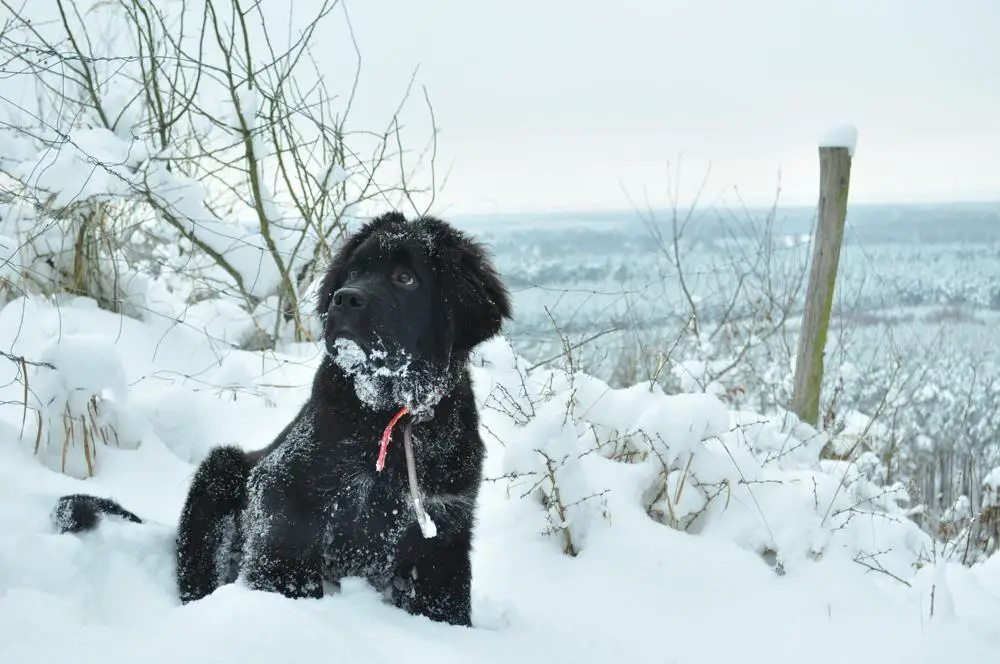
Newfoundland Litter Size
Researchers from the Norwegian School of Veterinary Science did a study where they counted the numbers of puppies in 57 different Newfoundland birth litters.
From this study, the researchers found that the average number of puppies that Newfoundlands can have is 6 puppies. Also, the Newfoundland can have as few as 1 puppies per litter and as many as 12 puppies per litter.
The number of puppies that the Newfoundland will have depends on factors such as the age of the Newfoundland, the method of pregnancy, etc.
Click here to see our calculator for predicting how many puppies your Newfoundland will have and how the litter size of the Newfoundland compares to the litter size of other dog breeds.
How Fast Newfoundlands Can Run

How fast a dog breed can run is a good measure of how athletic the dog breed is.
The American Kennel Club (AKC) regularly conducts dog running competitions. The AKC records the running speed of competing dogs in these competitions. These competitions are open to all dog breeds.
Based on our analysis of the speeds of 27 different Newfoundlands, the average speed of the Newfoundland is 18.5 mph (29.7 kmph).
The fastest speed on AKC record that the Newfoundland ran in a race is 23.88 mph (38.4 kmph) and the minimum speed on record in a race for a Newfoundland is 7.96 mph (12.8 kmph).
Click here to see how the speed of the Newfoundland compares to the speed of other dogs and other mammals such as cats, horses, humans, etc.
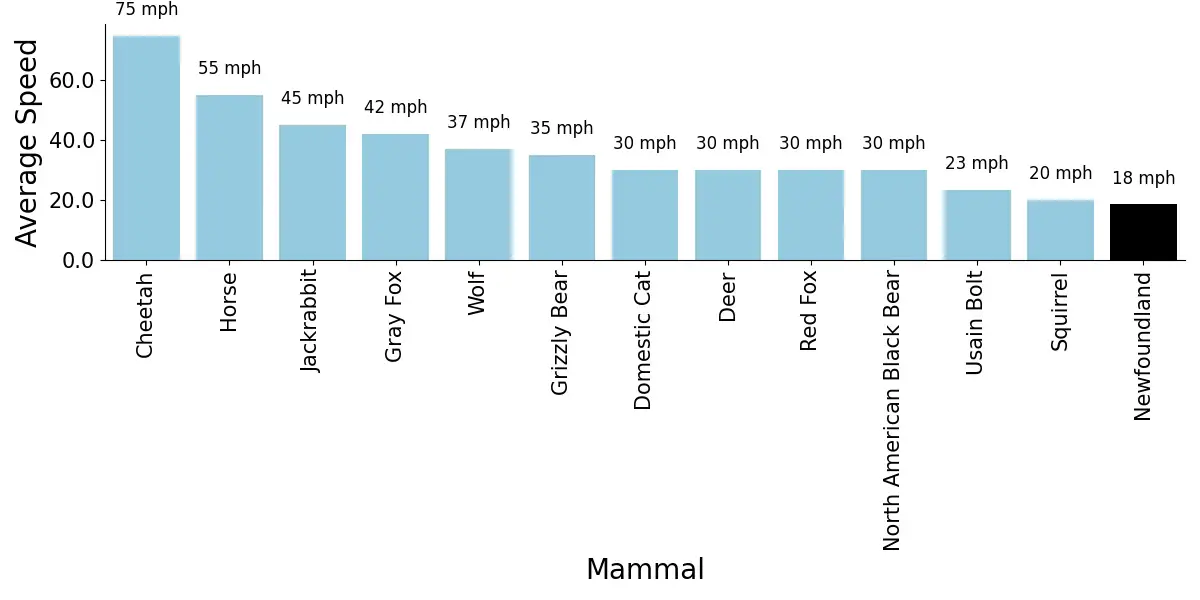
Good Names for Newfoundlands
Here are some really good names that are typical for the Newfoundland ranked by popularity:
- Teddy
- Howie
- Deejay
- Rockland
- Duke
- Hobbs
- Raisin
- Zhuangzhuang
- Axl
- Rupert

How Intelligent are Newfoundlands?
| Newfoundland | |
|---|---|
| Intelligence Rank | 34 out of 130 dog breeds |
| Trainability | Tend To Learn New Commands After 15 To 25 Repetitions |
According to Prof. Stanley Coren, a Canadian psychology professor/dog trainer, the total intelligence that a dog demonstrates is the addition of three types of intelligence. These intelligence types are:
- Instinctive Intelligence: This is the natural intelligence that comes from instinct. For example, dog breeds that have been historically bred to be guard dogs will have a high `guarding` intelligence compared to dogs that were not bred for guarding.
- Adaptive Intelligence (learning and problem-solving ability): This indicates what a dog can learn to do for himself or herself. Adaptive intelligence is specific to each dog, and not breed specific. You can improve your dog`s adaptive intelligence by investing time to train your dog.
- Working/Obedience Intelligence: This type of intelligence is breed-specific. Certain dog breeds tend to have higher working/obedience intelligence than some other breeds. This intelligence is the closest to what we might call school-learning ability and it is based upon what the dog can learn to do when instructed by humans. This type of intelligence can be measured for each dog breed and compared to that of other dog breeds.
Professor Stanley Coren measured and ranked the working intelligence of about 130 different dog breeds.
Prof. Coren found that the Newfoundland has an obedience intelligence rank of 34 out of 130 dog breeds. Thus, Prof. Coren put Newfoundlands in the `Above Average Working Dogs` category.
This means that Newfoundlands tend to learn new commands after 15 to 25 repetitions.
However, we should mention that a dog should not be judged based on its intelligence alone. There are other important factors you need to consider when deciding on which dog breed to get. These other factors include sociability, adorability, and compatibility of the dog breed with your lifestyle.
See the intelligence ranking of some other dog breeds below:
| Breed | Intelligence Rank |
|---|---|
| German Shepherd Dog | 3 |
| Doberman Pinscher | 5 |
| English Springer Spaniel | 13 |
| Belgian Sheepdog | 15 |
| Brittany | 19 |
| Belgian Malinois | 22 |
| Vizsla | 25 |
| Cardigan Welsh Corgi | 26 |
| Chesapeake Bay Retriever | 27 |
| Norwegian Elkhound | 36 |
| Affenpinscher | 37 |
| Bedlington Terrier | 40 |
| American Foxhound | 46 |
| Alaskan Malamute | 50 |
| Akita | 54 |
| French Bulldog | 58 |
| Italian Greyhound | 60 |
| Chinese Crested | 61 |
| Bullmastiff | 69 |
| Basenji | 78 |

How Popular are Newfoundlands with New Dog Owners?
Every year, the American Kennel Club (AKC) publishes information on how popular a dog breed is in that particular year. The AKC gets the popularity information of a breed from how many dogs of that breed the owners register with the AKC every year. The AKC collects this data for about 200 dog breeds.
The graph below shows the popularity trend of the Newfoundland.
The popularity of the Newfoundland averaged over the years is Number 38 out of about 200 dog breeds.
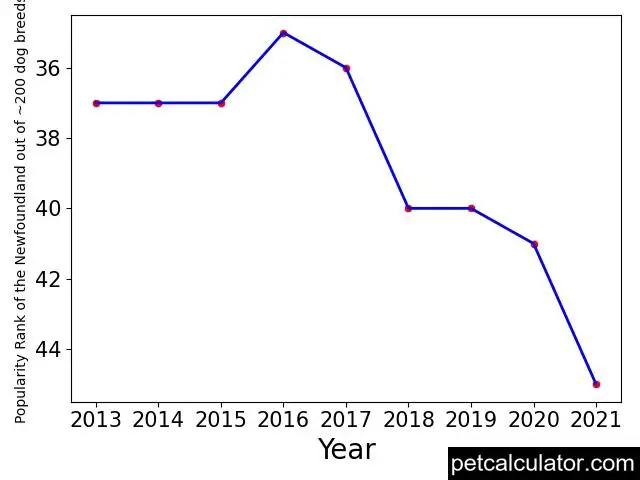
Do not get a dog breed just because it is a popular dog breed. And do not reject a dog breed just because it is an unpopular breed.
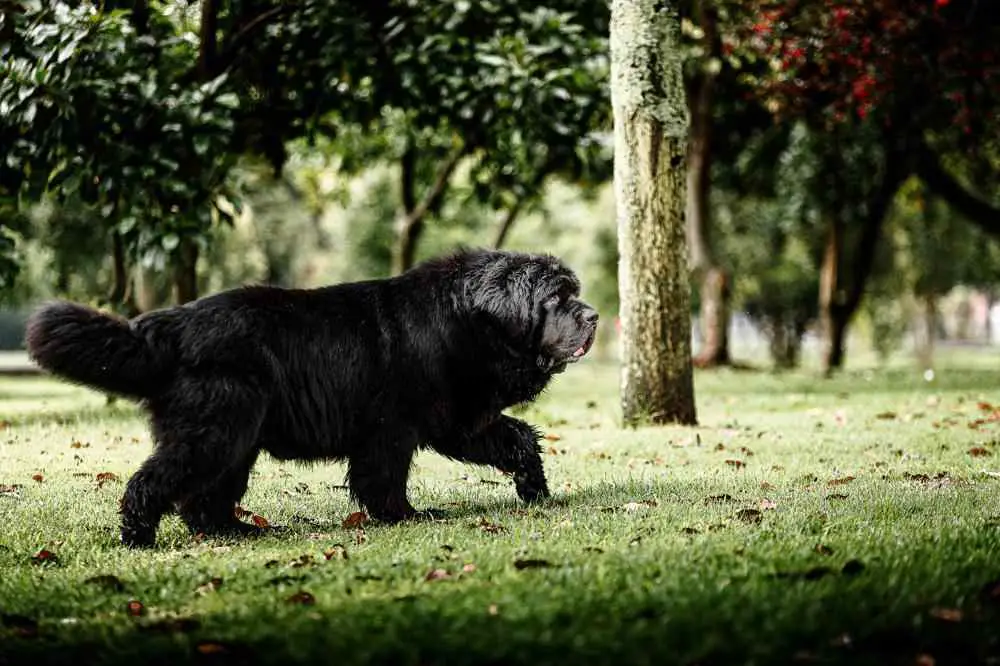
Health Problems in Newfoundlands and How to Prevent Them
Every dog breed has its own set of health problems that it tends to develop. There is nothing like a perfect dog breed.
The Newfoundland is prone to certain genetic health conditions. The Orthopedic Foundation for Animals (OFA) is an organization that keeps track of genetic health problems in dog breeds.
From the extensive records that the OFA keeps, the OFA knows what health problems each dog breed is naturally prone to develop.
Hence, the OFA recommends which health screening breeders should perform on a dog breed to make sure that the breeders won`t breed `defective` dog parents that can pass down defective genes to their puppy offspring.
If you want a Newfoundland puppy that will grow up to be healthy, make sure that your Newfoundland breeder screens your puppy or your puppy`s parents for the health problems that the OFA recommends for your puppy`s breed. This will increase the chances that your puppy is free from genetic defects.
The following are the health tests that Orthopedic Foundation for Animals (OFA) recommends that breeders should screen Newfoundlands for:
You can find out more about OFA`s recommended tests for Newfoundlands here.
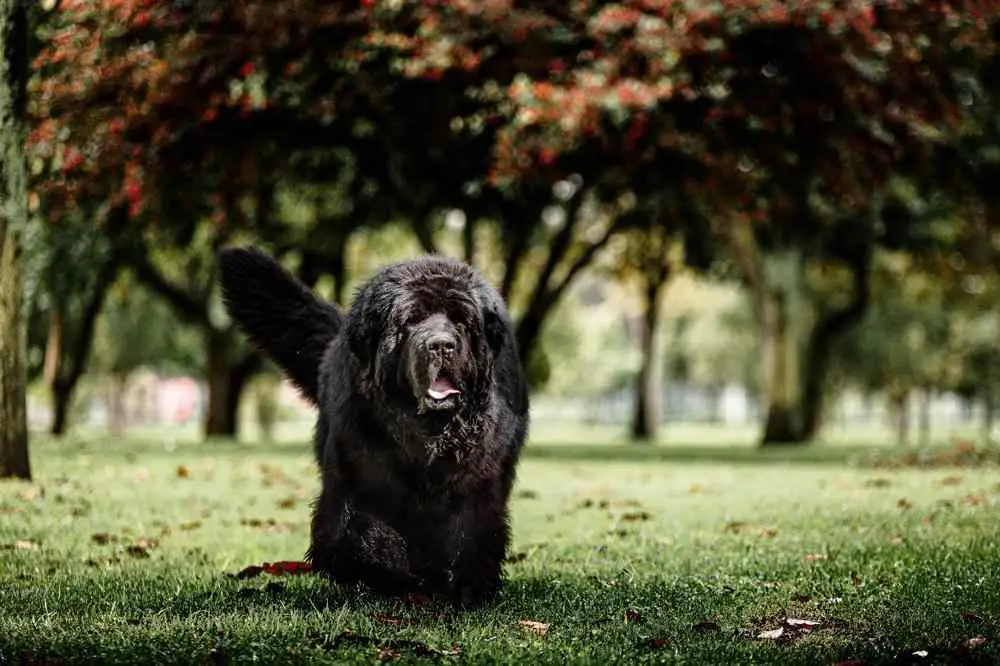
How to Take Care of Newfoundland
To take good care of your Newfoundland, you need to make sure that you groom your Newfoundland regularly.
Secondly, you need to find a veterinarian in your area that will routinely check the health status of your Newfoundland regularly, and give you appropriate recommendations on your Newfoundland`s preventative care.
Thirdly, you need to commit some time to exercise your Newfoundland daily. Regular exercise helps improve the health and quality of life of your Newfoundland.
Also, you need to feed your Newfoundland high-quality dog food, and the food should be of the right amount to prevent your Newfoundland from getting overweight or underweight.
See our recommendations on what to feed the Newfoundland and how much food to feed the Newfoundland at different life stages.
Finally, you need to make sure that your Newfoundland has access to clean water all the time. See our recommendations on how much water your Newfoundland needs to drink at different ages.
Dog Breeds That Are Similar to Newfoundlands
If you have not made up your mind on which dog breed to get, you may also want to consider some other dogs similar to the Newfoundland.
We crunched the numbers and found that the following dog breeds that have similar behavior and temperament as the Newfoundland:
- Golden Retriever (71 percent match with Newfoundland). Learn more about the Golden Retriever here.
- Saint Bernard (68 percent match with Newfoundland). Learn more about the Saint Bernard here.
- Bernese Mountain Dog (79 percent match with Newfoundland). Learn more about the Bernese Mountain Dog here.
- Collie (68 percent match with Newfoundland). Learn more about the Collie here.
Other Things to Know About Newfoundlands
Here are some of the very important characteristics of the Newfoundland that you need to know about the Newfoundland breed:


